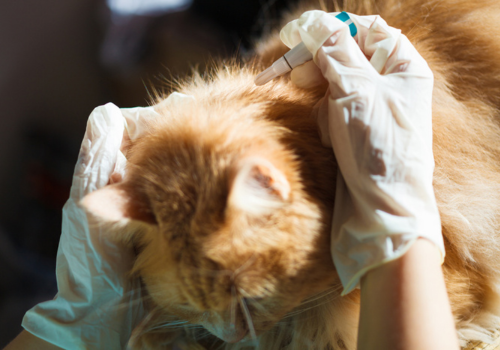As a pet owner, keeping your cat safe and happy should be one of your biggest concerns. And one of the serious problems you need to shield your feline friend from is heartworm disease. It is caused by a type of worm that, if left untreated, can cause serious health complications and even death. In this article, we will discuss what heartworm is, how cats get it, what preventive measures you should take to protect your pet, the symptoms of infection, how it is diagnosed, and why it is important to detect feline heartworm early.
What is heartworm in cats?
Heartworm is a type of worm, scientifically known as Dirofilaria immitis, that can infect cats, dogs, ferrets, and other mammal species. The worms live in the heart, lungs, and associated blood vessels of affected pets and cause severe lung disease, heart failure and damage to other organs in the body. Unlike dogs, cats are atypical hosts for heartworms, and most worms in cats do not survive to the adult stage. However, even immature worms can lead to a condition known as Heartworm-Associated Respiratory Disease (HARD).
How do cats get heartworm?
Cats get heartworm by being bitten by a mosquito, just like dogs. A mosquito takes blood from an infected animal, and when it bites your cat, it injects immature larvae, which infects them with heartworm. The larvae then migrate and mature over several months, eventually making their way to the heart and pulmonary arteries. They eventually mature into adult heartworms and reproduce approximately six months after being injected into the cat. By the time this occurs, heartworm disease rapidly becomes fatal.

What do you recommend as heartworm prevention for cats?
There is a pill-form heartworm preventative that also prevents intestinal parasites, just like dogs, and there are also topical products. Advantage Multi and Revolution are the most common topicals for preventing heartworm in cats. Cats tend to do better with topicals because it’s often difficult for pet owners to get their cats to take a pill.
How do you spot heartworm symptoms in a cat?
Heartworm symptoms in cats are very asthma-like, making it somewhat easy to identify unless your cat has advanced lung disease with these symptoms already present.
Symptoms of heartworm in cats include:
- Coughing, possibly due to fluid in the lungs
- Open-mouth breathing
- Panting
- Labored breathing
- Vomiting
- Convulsions
- Lethargy
- Weight loss
How does a veterinarian diagnose heartworm in a cat?
Unfortunately, there isn’t a standard test used for diagnosing heartworm in cats, as there is for dogs. Instead, veterinarians must run a series of tests to determine that heartworm is causing the symptoms.

Veterinarians diagnose heartworm in cats with the following tests:
- Urinalysis
- Heartworm antibody test to determine if a cat's immune system has been exposed to heartworms
- Heartworm antigen test to determine the presence of adult female heartworms
- X-rays to view the size and shape of a cat's heart since cats with heartworm develop enlarged pulmonary arteries
- Ultrasound to view the internal structures of the heart and surrounding vessels
- White Blood Cell Count measured, specifically eosinophils which occur in higher numbers when heartworm is present
Cat heartworm diagnosis is challenging because the damage is usually done from the migrational state or the larvae. The larvae migrate, causing a tremendous immune response in the cat because their immune system doesn’t want them there. As the worms arrive in the cat’s lungs, the immune system destroys them, but they cause so much inflammation that they have a significant asthma-like reaction. The American Heartworm Society provides insight on what steps you should take if your cat tests positive for heartworm disease.
Why is early detection and diagnosis of heartworm in cats important?
Early heartworm detection in cats is critical since the lung damage is permanent, and those asthma-like symptoms don’t disappear. Also, if the worms become adults, 12-inch worms can coil around a cat’s tiny heart. A single worm can be devastating to a cat since there is no conventional heartworm treatment if they develop adult worms. The worms can only live a couple of years in a cat since it’s not a natural host, and unfortunately, once the worms die, the inflammatory reaction of decaying worms causes the cat to die with them. Heartworm prevention in cats is critical because once they get an infestation and it reaches adulthood, it's fatal most of the time.
The AVMA offers additional insight into heartworm disease. If you have further questions about cat heartworm disease, reach out to your veterinarian. If you live in or near Point Pleasant, NJ, we’d love to see your cat if they’ve developed asthma-like symptoms, so please don’t hesitate to call us at (567) 361-3407 or email us at [email protected].

